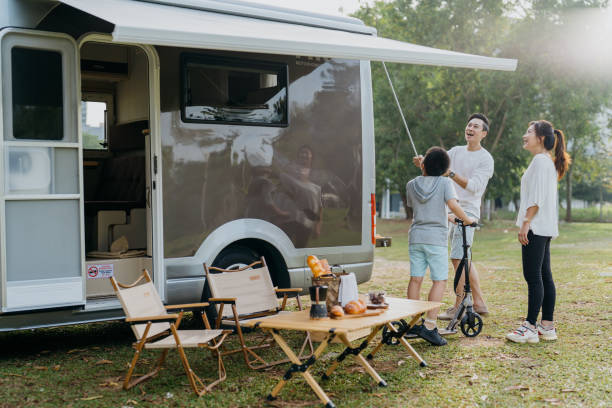RVs vs. Campers: Understanding the Variances
RVs vs. Campers: Understanding the Variances
Types of Campers
When it comes to exploring the great outdoors and embarking on a memorable adventure, having the right vehicle is key. Two popular options for outdoor enthusiasts are RVs (Recreational Vehicles) and campers. While both of these vehicles offer the freedom to travel and experience nature, there are notable differences between the two. In this article, we will delve into the various types of campers, highlight the differences in RVs, and ultimately compare RVs with campers to help you make an informed decision for your next outdoor getaway.
Differences in RVs
RVs, also known as motorhomes, are fully self-contained vehicles that combine both living quarters and a driving space in one unit. They are classified into three main types: Class A, Class B, and Class C.
1. Class A RVs: These are the largest and most luxurious motorhomes available. They resemble a bus and provide ample space for living and sleeping. Class A RVs often come equipped with multiple slide-outs, which can significantly increase the interior space when parked. They are best suited for long road trips or extended stays at campgrounds.
2. Class B RVs: Also known as campervans, Class B RVs are smaller in size compared to Class A motorhomes. They are built on a van chassis, making them easy to drive and maneuver. Despite their compact size, Class B RVs offer basic amenities such as a small kitchen, sleeping area, and bathroom. These versatile vehicles are ideal for individuals or couples looking for a compact and efficient camping option.
3. Class C RVs: Falling between Class A and Class B, Class C RVs are built on a truck chassis. They provide a suitable balance between space and maneuverability. Class C motorhomes are characterized by a distinctive overhang above the driver's cab, which often serves as an additional sleeping area or storage space. They offer amenities similar to those in Class A RVs but at a more affordable price point.
In addition to these main classifications, there are variations and subtypes within the RV category that cater to specific needs and preferences. For example, some RVs are designed for off-road adventures and feature enhanced suspension systems, larger water tanks, and rugged exteriors.
RVs vs. Campers
While RVs encompass a wide range of motorhome options, campers typically refer to towable trailers that are hitched to a separate vehicle for transportation. There are several types of campers available, each with its own features and benefits.
1. Travel Trailers: Travel trailers are the most common type of camper and come in various sizes and configurations. Ranging from compact teardrop trailers to spacious fifth-wheel trailers, there is a travel trailer to suit every need. These campers often feature living and sleeping quarters, a kitchen, and a bathroom. They are towed behind a vehicle and can be unhitched for easier exploration once parked.
2. Pop-up Campers: Also known as tent trailers or folding campers, pop-up campers offer a more lightweight and compact option for camping enthusiasts. These campers are easy to tow and set up, making them a popular choice for weekend getaways. When closed, they resemble a compact trailer and have a low profile. However, once opened, they provide ample living space, with fold-out sleeping areas and basic amenities.
3. Truck Campers: Designed to fit onto the back of a pickup truck, truck campers offer convenience and versatility. They are lightweight and take advantage of the truck's spacious bed area. Truck campers typically feature a sleeping area, kitchenette, and small bathroom. They are an excellent option for those who already own a pickup truck and want to venture into camping without the need for a separate towing vehicle.
4. Fifth-Wheel Trailers: Similar to travel trailers, fifth-wheel trailers are towed by a separate vehicle. However, what sets them apart is their unique hitching mechanism, which connects to a specialized fifth-wheel hitch in the bed of a pickup truck. This arrangement provides increased stability and maneuverability while towing. Fifth-wheel trailers often boast luxurious amenities and spacious living areas, making them a popular choice for long-term camping or full-time living.
It is important to note that although RVs and campers serve the same purpose, there are distinct differences to consider when choosing between the two. RVs offer the convenience of an all-in-one vehicle, allowing you to travel and live comfortably without the need for separate towing. On the other hand, campers provide flexibility and the ability to unhitch and explore the surroundings with a separate vehicle.
Ultimately, the decision between an RV and a camper depends on factors such as budget, space requirements, towing capacity, and the level of comfort desired. It is always recommended to thoroughly research and compare different options before making a decision.
Conclusion
RVs and campers are popular choices for outdoor enthusiasts looking to embark on memorable adventures. While RVs offer the convenience of an all-in-one vehicle, campers provide flexibility and the ability to unhitch for exploration. Understanding the different types of campers and the variations within the RV category can help in making an informed decision. Whether you choose an RV or a camper, the most important thing is to get out there and enjoy the beautiful sights and experiences that nature has to offer. Happy camping!
Note: The above article provides an overview of RVs, campers, and their variations. Before making a purchasing decision, it is recommended to consult with professionals in the industry and consider personal preferences and requirements.





